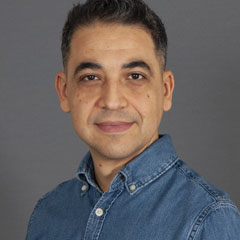Rodrigo Moreno-Serra, Professor of Global Health Economics, Centre for Health Economics
Rodrigo obtained a BSc (Hons) in Economics and an MSc in Economics of Institutions and Development, both from the University of Sao Paulo (Brazil). He then moved to the United Kingdom and obtained a PhD in Economics from the University of York.

He is a health economist with a particular interest in health financing and impact evaluation of the consequences of conflict and forced displacement for population health and the health system.
He is currently Professor of Global Health Economics and Co-Team Leader of the Global Health Team at the Centre for Health Economics, University of York.
email: rodrigo.morenoserra@york.ac.uk
Our 60-second interview with Rodrigo:
What do you do in the field of mental health?
My involvement in the field of mental health has emerged as a natural consequence of my interest in researching the consequences of conflict and displacement for health systems and population health. From my research in settings like Latin America and Palestine, I have been struck about how the mental health consequences of exposure to violence and forced displacement are as important as – and may often compound – the physical health consequences of such phenomena. So I have been doing research to understand what populations tend to be more affected in those contexts in terms of their mental health and to what extent (looking at aspects like tendencies to develop mental disorders and more general health-related quality of life). I am also interested in how to design and finance interventions that work to protect the mental health of these vulnerable populations.
What do you find most rewarding and inspiring in this work?
My research is normally conducted in close partnership with local stakeholders in the study countries, including from academia, decision-making and civil society circles. I find these collaborations to be invaluable, not only to make the research more robust and contextually relevant, but also to increase the potential of the research to make an actual difference to the mental health of populations living under very challenging circumstances.
What is the most challenging or complicated aspect of this work?
I am an applied health economist, so good datasets are essential for me to do my job! Although decent datasets with mental health-related information are available in some countries that I have worked in, in other instances it is necessary to collect your own data to be able to carry out relevant research – which can be very tricky when you are interested in conflict-affected or migrant groups.
What impact do you hope your work is having- or can potentially have?
I hope my work is contributing to generating actionable mental health policy evidence that can inform decision-makers in fragile and resource-constrained settings. Of course, my ultimate expectation is that better policies implemented from there will improve mental health outcomes in those settings.
Could you share with us one piece of advice that you follow for your own mental health?
Work overload is usually one of the main culprits of stress for me. So I have been trying to get better at saying “no” to things! This basically means politely declining to participate in activities that may sound like “possibly interesting stuff”, but that often end up adding up to an unsustainable workload later down the line.
Another important thing for me is to end the work day with a physical activity (running, walking etc), to shake the body and help me make a clean break with work activities.